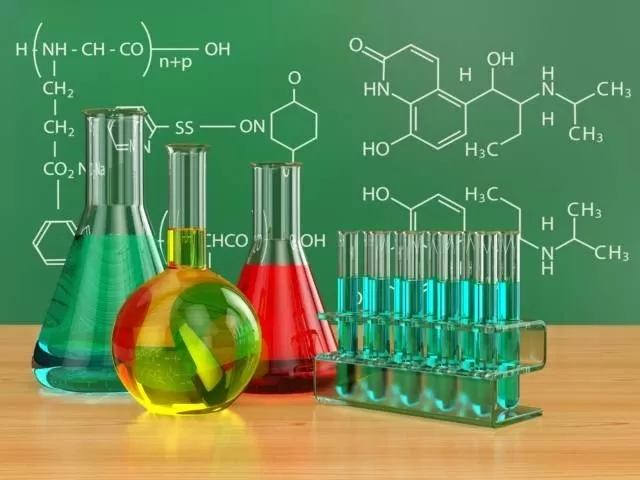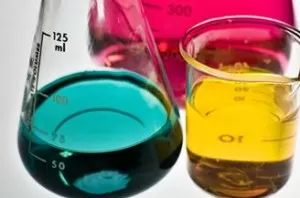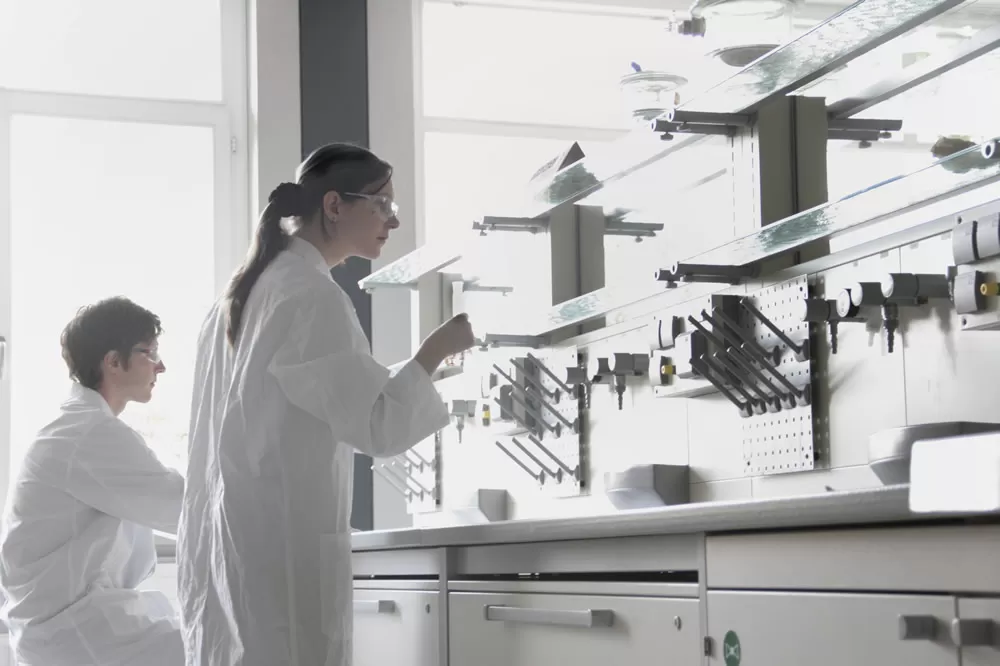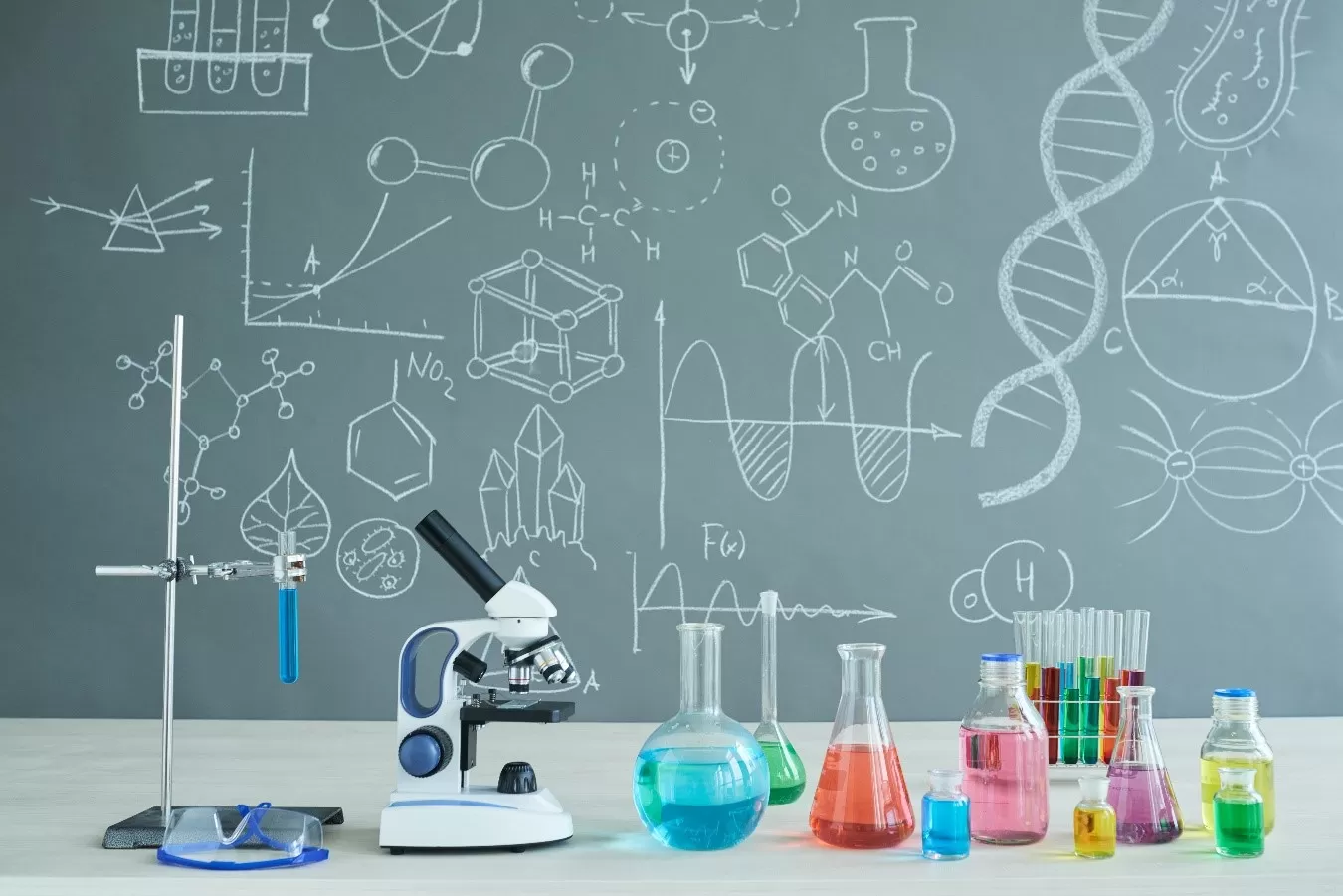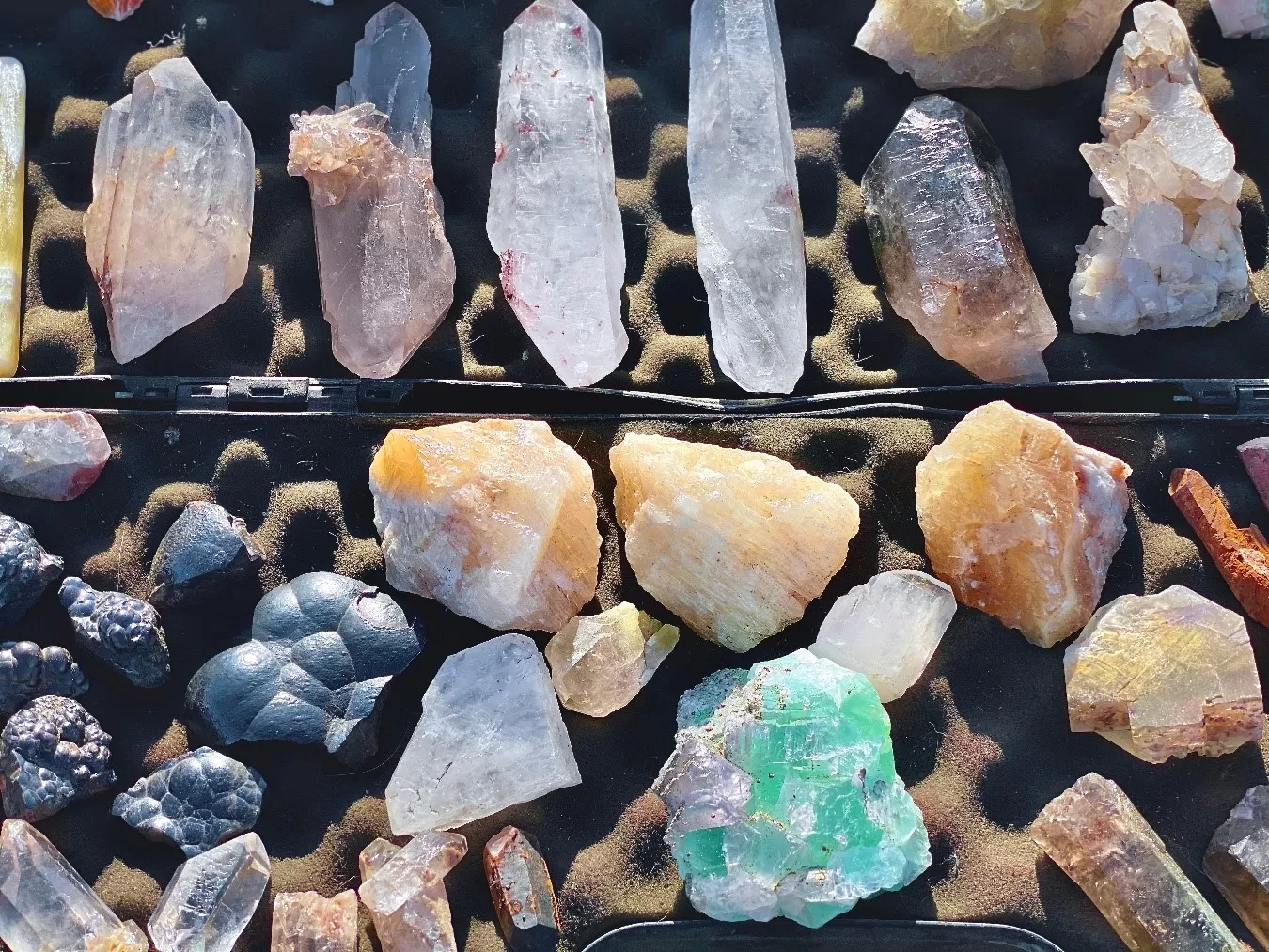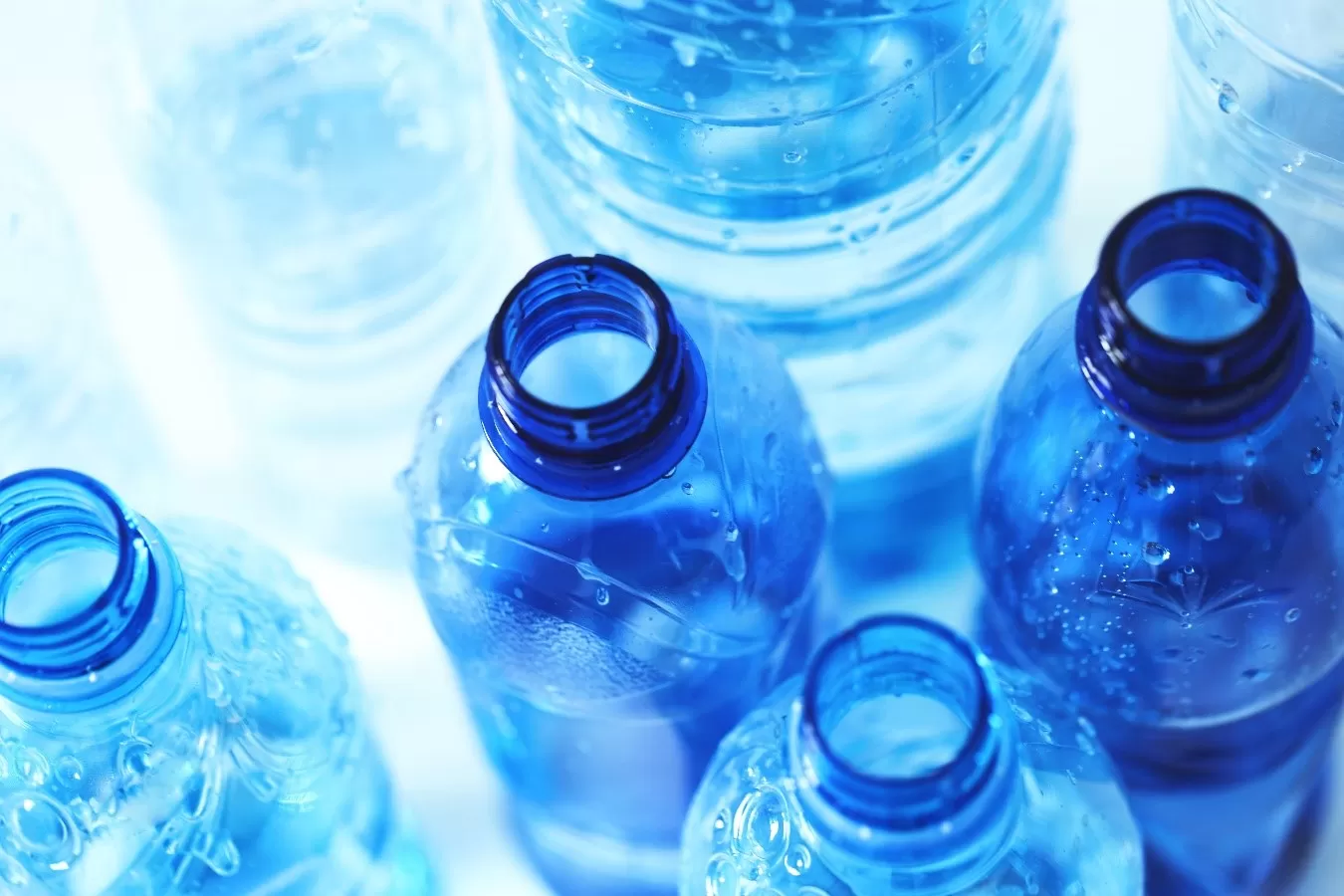Alkali or base, according to Brönsted-Lowry
Chemical Glossary Terms

|
A B C D E F G H I J K L M N Ñ O P Q R S T U V W X Y Z
|
Chemical Terms begining with A

Absorption.
Penetration or impregnation of a solid material by a liquid or a gas. The absorption of light consis...
Particle accelerator.
Machine designed to accelerate charged particles to a suitable energy to bomb a target and cause nuc...
Electron acceptor
Atom or group of atoms that receives a pair of non-shared electrons to form a coordinated covalent b...
Proton acceptor
Atom or set of atoms capable of receiving a proton of a substance that gives it up. According to Lew...
Ethyl acetate
Volatile liquid called ethyl ethanoate in the systematic nomenclature. It has a pleasant fruity smel...
Acetylene
Colorless and toxic gas, called etino. Its combustion is very exotic and the flame obtained sores at...
Acetone
Organic compound, simpler and the most important of ketones, called propanone. It is a colorless liq...
Acidity (degree of ..)
Excess hydrogen ions (H +) or hydronium ions (H3O +) in an aqueous solution in relation to those con...
Acid
Substance composed of metalloid and hydrogen (hydrazides) or also of metalloid, oxygen and hydrogen ...
Hydrofluoric acid (fluoride + hydroxide)
HF (hydrogen fluoride) is a colorless, poisonous and strongly fuming liquid. Normal boiling point at...
Acidic acid
Colorless liquid, called ethanoic acid in the systematic nomenclature. It is present in vinegar, to ...
Acetylsalicylic acid
Organic compound derived from salicylic acid. It is a drug that is used against pain and rheumatism;...
Ascorbic Acid
Organic compound that appears as a white powder very soluble in water, with an acidic flavor. It is ...
benzoic acid
Organic acid crystallizes in white needle forms soluble in ethanol and ether and melts at 122.5 ° C...
Bromhydric acid
Aqueous solution of bromine hydride, HBr. The? Bromide acid acts as a strong acid and is commerciali...
Briquetic acid
It is a very strong acid that can not be prepared in concentrated solutions, since it tends to decom...
Butenodioic acid
Compound with a double bond and two carboxylic groups. The double enlce presents a geometric isomer?...
Butter-rich acid
Oily liquid with a stale oil odor, is present in butter and is obtained by fermentation of glycides ...
Hydrocyanic acid
Dissolution of hydrogen cyanide HCN, in water. It is a colorless liquid that gives off the smell of ...
Cyanic acid
Chemical compound of HOCN formula. It appears as a colorless, toxic, volatile and very unstable liqu...
Conjugated acid.
Substance that results from adding a proton (H3O +) to a base. The NH4 + ion is the conjugate acid o...
Ethanoic acid
It is a crystalline solid, soluble in water, alcohol and ether. It is obtained insdustrially by heat...
Formic acid
carboxylic acid, the simplest, called methanoic acid. The acidic acid is found in ants, nettles and ...
Phosphoric acid
Oxo-acid of phosphorus, strictly speaking, the designation of phosphoric acid encompasses all oxo-ac...
Oleic acid
Long chain unsaturated fatty acid that is part of fats and oils. It is the main component of olive o...
palmitic acid
Saturated fatty acid that is part of fats and oils. It is found in butter and lard, so? as in coconu...
Pentanoic acid
Monocarboxylic acid found in valerian oil. It is a colorless liquid, of penetrating smell and flavor...
Pyruvic acid
The simplest of the keto acids, it is a solid that melts at 13.5ºC and is soluble in water, alcohol...
Propanoic acid
Monocarboxylic acid. It is a colorless liquid with penetrating odor, soluble in water, alcohol, chlo...
Salicylic acid
Aromatic carboxylic acid that appears in the form of colorless needles with a bitter taste, soluble ...
Thiocyanic acid
Chemical compound of formula HSCN. It is a white crystalline solid, soluble in water, and with stron...
Uric acid
Final product of the purine metabolism in man and other vertebrates, it is a crystalline, colorless ...
Hydrochloric acid
Aqueous solution of hydrogen iodide, HI, is a pale yellow gas, dense and toxic, which forms a yellow...
Acid, according to Brönsted-Lowry.
It is a chemical species that donates hydrogen ion or that yields one proton to another.
Actinides
Set of elements that constitute the second series of internal transition. It goes from thorium to la...
Actinium
Chemical element of Ac symbol, belonging to group 3 of the periodic table, of atomic number 89 and a...
Activation of neutrons.
Submit any substance to the bombardment of neutrons in a nuclear reactor or a neutron source. Activa...
Radioactive activity
Number of nuclear disintegrations per unit of time. The most common unit of reactivity is the curie ...
Adrenalin
Hormone secreted by the adrenal medulla. The secretion of adrenaline in the blood causes a series of...
Adsorption.
It occurs when a gas is deposited on the surface of a solid by weak Van der Waals bonds. Activated c...
Electronic affinity
Energy absorbed or released when a neutral atom of an element is a gaseous state captures an electro...
Complexing agent.
Anion or molecule that binds to an atom of a metal to form a complex ion. Examples of complexing age...
Chelating agent
Ligand of a complex ion that can form more than one bond with the central ion. Ethylenediamine can f...
Tensoactive agent.
Chemical product that is added to detergents to decrease the surface tension to reduce the adhesion ...
Distilled water
Pure water obtained through the process of distillation of impure water or water containing dissolve...
Heavy water
Common name of deuterium oxide, it is a denser liquid than water and chemically active; It is used i...
Water regia
Mixture of nitric acid and hydrochloric acid in a ratio of 1 to 3. It is a very energetic oxidant. I...
Mother waters
Solution in which a precipitate is originally obtained. It is separated from its mother liquors by f...
Insulating.
Material that has the property of preventing the loss of heat or electricity. It also refers to the ...
Alkali or base, according to Brönsted-Lowry
It is a chemical species accepting the hydrogen ion or accepting one proton from another.
Alcalimetry
Volumetric analysis method that allows the quantitative assessment of an acid by neutralization with...
Alkaline
Family of elements belonging to group IA of the periodic table, with the exception of hydrogen. Reac...
Alkaline-earth
Family of elements belonging to group IIA of the periodic table. They have properties like those of ...
Ãlcalis
Substances that possess the OH- functional group, responsible for the basic characteristics of such ...
Alkanes
Set of simpler organic compounds formed by carbon and hydrogen. They are said to be saturated becaus...
Alcohols
Organic compounds that have a hydroxyl group attached to a carbon atom. They have higher boiling poi...
Aldehyde
Organic compounds that have group -CH = O linked to another carbon atom. They are the first oxidatio...
Alloy.
Mix of metals after being melted. Brass is an alloy of copper and zinc, copper and tin bronze. They ...
Aliquot.
Volume of liquid that corresponds to a known fraction of a larger volume.
Starch (from lat. V. Amidum and this from gr .amylon).
Gluccido polysaccharide (C6H10O5) x, is split into amylose (soluble in water in low concentrations) ...
Alotropy (alo- + -tropy)
Property of some chemical elements to present more than one solid phase (crystalline form) for examp...
Allotropes
Existence of the elements in two or more forms, or different molecular configurations. For example, ...
Alquenos
Hydrocarbons that have one or more carbon-carbon double bonds in their molecule are named like alkan...
Alquinos
Hydrocarbons that contain one or more triple bonds. They are named as the alkanes of the same number...
Aluminum
Chemical element of symbol Al, belonging to group 13 of the periodic table, of atomic number 13 and ...
Amalgam
Mercury alloy with another metal. Mercury forms amalgams with almost all metals except iron and thes...
Amethyst
Chemical element of Am symbol, belonging to the series of actinides of atomic number 95. is a radioa...
Amides
Compounds derived from carboxylic acids in which the -OH group has been replaced by -NH2. the nomenc...
Amines
Organic compounds derived from ammonia by replacing one or more hydrogen atoms with organic groups. ...
Amino acid
Basic structural unit of proteins. An amino acid consists of an amino group, a carboxyl group, a hyd...
Ammonia
Chemical compound of formula NH3. It is a colorless gas with a characteristic odor. It is corrosive ...
Qualitative analysis
Branch of analytical chemistry that studies the nature of the components of a mixture or a substance...
Quantitative analysis
Branch of analytical chemistry that studies the composition of a mixture or a substance. The result ...
Volumetric analysis
Quantitative analysis technique consisting of the experimental measurement of the volumes involved i...
Analyte
Species or species of a sample that will be the subject of a chemical analysis.
AnfÃgenos
Denomination of all the elements of group 16 of the periodic table, also called chalcogens. They are...
Amphiprotism.
Property that some electrolytes have to act as acids or bases; it is also called amphotericism. The ...
Amphitheater
Compound that can react tanco with an acid as with a base, that is to say, that can act like base or...
Angstrom.
Unit of measurement that is equivalent to ten millionth of a millimeter. It is used to measure wavel...
Anhydride
Name, currently in disuse, with which it designates the oxides of non-metallic elements. It is used ...
Anhydrous
Solid substance that has lost all the water of crystallization. It is mainly applied to salts.
Aniline
Oily and colorless liquid with a characteristic odor, containing phenylamine. It is poorly soluble i...
Anion.
Chemical species negatively charged because it has excess electrons. The anions are attracted by the...
Antibiotic
Chemical substance capable of inhibiting the growth of microorganisms or eliminating them. It usuall...
Antimony
Chemical element of symbol Sb, belonging to group 15 of the periodic table, of atomic number 51 and ...
Antioxidant
Substance that reduces the oxidation rate of easily oxidizable bodies. The most important are aromat...
Anthracene
Tricyclic aromatic hydrocarbon. It is solid at room temperature, insoluble in water and soluble in o...
Arsenic
Chemical element of symbol As, belonging to group 15 of the periodic table, of atomic number 33 and ...
Asbestos
Impure magnesium, calcium, sodium and iron silicate. Formed by amphibole such as tremolite, antopili...
Assimilation of nitrogen.
Process of transformation of inorganic nitrogen (nitrates, nitrites or ammonia) to incorporate it in...
Astatus
Chemical element of symbol At, belonging to group 17 of the periodic table, of atomic number 85 and ...
Ionized atom.
Atom that has lost or gained one or more electrons. When it gains electrons, an anion is formed, and...
Atom.
The smallest unit of a chemical element, consisting of a central core surrounded by orbital electron...
Autocatalysis
Phenomenon that occurs when one of the products of certain chemical reactions acts as a catalyst for...
Autoprotólisis.
Ionization process of the molecules of a solvent. The reaction of water self -protoisis is: 2 H2O H3...
Azeotrope
Liquid mixture whose boiling point is constant. At the azeotropic point, the composition in the vapo...
Sulfur (lat. Sulphure).
Chemical element, non-metallic yellow, solid, brittle; It is native to volcanic areas and combined f...
Temas de química mas buscados

Pinzas de laboratorio
Son un tipo de sujeción ajustable, generalmente de metal, que forma parte del equipamento de laboratorio, mediante la ...
¿Que es la Química? Química General
¿Qué es la Química General? La química general es la base de todas las químicas y en el...
Noticias de Química

Incremento de estudios online en el área científica
El mundo de la ciencia ha cambiado significativamente en los últimos años debido al av...
La importancia de estudiar química
La importancia de estudiar química La química es una de las ciencias fundamentales ...
¿Qué es un manipulador de alimentos?
¿Qué es un manipulador de alimentos? Un manipulador de alimentos es una persona que tr...
Cómo estudiar química según Sergio Jacinto Gil García
La química es la ciencia que se encarga de estudiar las propiedades, composición y tra...
Tierras raras
El nombre de tierras raras se ha dado a un conjunto de 17 elementos químico como lo son:...
Tipos de plásticos de la industria química
Los plásticos son materiales duraderos, ligeros y fáciles de modificar ya que est&aacu...




